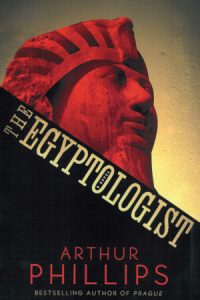Glossary
A Brief, Random Glossary for THE EGYPTOLOGIST |
| Atum: In Egyptian religion, the creator-god who created the next generation of gods by masturbating onto fertile soil.
Atum-hadu: “Atum-Is-Aroused”, the king of Egypt who named himself for the moment immediately prior to the creation of the universe (see Atum). Howard Carter and the Earl of Carnarvon: Partners (technical and financial) who in November of 1922 discovered the nearly undisturbed, intact tomb of King Tutankhamun (“The Living Image of Amun”). It was one of the most extraordinary finds in the history of Egyptology. Antiquities Service: The bureaucracy of the Egyptian government responsible for the issuing of permits to archaeologists, and the distribution of their discoveries. In 1922, the Service was under the direction of a Frenchman, Pierre Lacau. Hieroglyphic, Hieratic, and Demotic: Three written versions of the same spoken language, Egyptian. The XIIIth Dynasty: More or less the final dynasty of Egypt’s “Middle Kingdom,” ending about 1650 B.C., when the kingship collapsed into internal and external strife, a time known as the “Second Intermediate Period.” Admonitions: A common form of Egyptian literature, in which a king gives advice in morals and leadership to his successor. In the case of Atum-hadu, the Admonitions comprised eighty possibly rhyming quatrains though, as no one knows for certain how to pronounce Egyptian, the rhymes may be illusory. AIF: The Australian Imperial Force, the main body of Australia’s military force in World War I. Deir el Bahari: An area west of the Nile approximately 500 miles to the south of Cairo. The temple to Queen Hat-shep-sut is the centerpiece Gallipoli/The Bosporus: A military action of the First World War, 1915-16, in which the Australians and New Zealanders (ANZACs) suffered terrible losses in a misguided effort to invade Turkey. The Tomb Paradox: The dilemma faced by Egyptian kings facing death and wishing to secure their immortality. Immortality required that the king build a significant and well-stocked tomb, which attracted tomb robbers, who could disturb the physical remains of the late king, thus preventing his achieving immortality. Alternately, a secret tomb might mean that the living would not continue to perform the rituals commemorating the late king, also preventing his achieving immortality. Emma Pip: British slang for a military policeman. Canopic Jars: A set of four clay pots, included in the tomb’s furnishings, which contained the buried person’s organs. |

